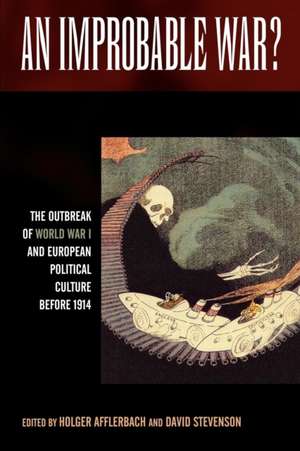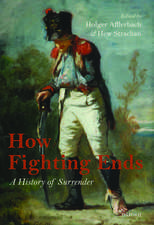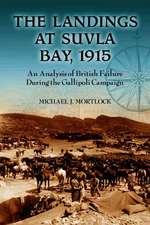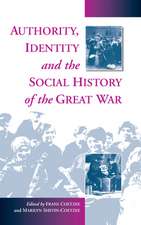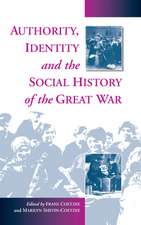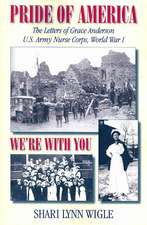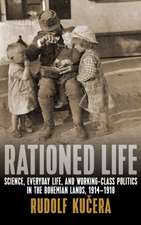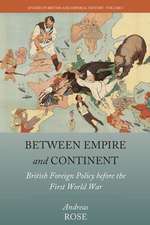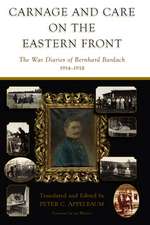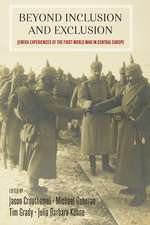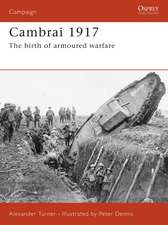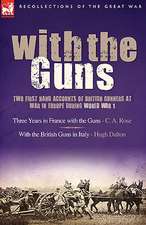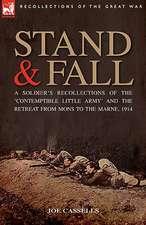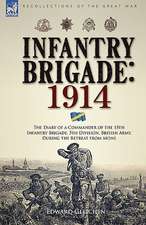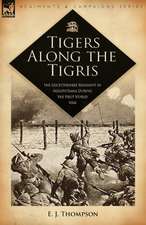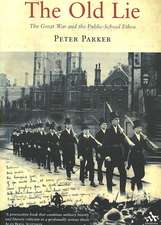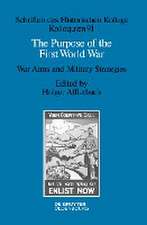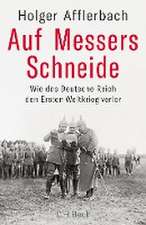An Improbable War? the Outbreak of World War I and European Political Culture Before 1914
Editat de Holger Afflerbach, David Stevensonen Limba Engleză Paperback – 31 dec 2011
...outstanding scholarly analyses...These essays comprise a valuable addition to the never-ending debate on the causes of the Great War. Stand To! The Journal of the Western Front Association...vigorously and thoughtfully renews one of the great, enduring questions of twentieth-century European and world history. This is a landmark book that sums up the state of research and suggests fruitful possibilities for going forward. German Studies Review
The value of the book is in the chapters, all of which are thoughtful and well argued. The International History Review
Like any provocative book, this one forced me to rethink some of my historiographical assumptions. Bryan Ganaway, College of Charleston
The First World War has been described as the "primordial catastrophe of the twentieth century." Arguably, Italian Fascism, German National Socialism and Soviet Leninism and Stalinism would not have emerged without the cultural and political shock of World War I. The question why this catastrophe happened therefore preoccupies historians to this day. The focus of this volume is not on the consequences, but rather on the connection between the Great War and the long 19th century, the short- and long-term causes of World War I. This approach results in the questioning of many received ideas about the war's causes, especially the notion of "inevitability."
Holger Afflerbach specializes in 19th- and 20th- Century German history; international relations; military history, particularly World War I and World War II, as well as Austrian and Italian history and has written widely on these topics. He is teaching at the University of Leeds.
David Stevenson is Stevenson Professor of International History at the London School of Economics and Political Science. He specializes in the history of international relations in Europe since c.1900, with particular reference to the World War I. His recent publications include Armaments and the Coming of War: Europe, 1904-1914 (Oxford, 1996), Cataclysm: The First World War as Political Tragedy (New York, 2004) and With Our Backs to the Wall: Victory and Defeat in 1918 (Allen Lane, 2011)
| Toate formatele și edițiile | Preț | Express |
|---|---|---|
| Paperback (1) | 301.59 lei 43-57 zile | |
| BERGHAHN BOOKS INC – 31 dec 2011 | 301.59 lei 43-57 zile | |
| Hardback (1) | 836.81 lei 43-57 zile | |
| BERGHAHN BOOKS INC – 24 oct 2007 | 836.81 lei 43-57 zile |
Preț: 301.59 lei
Nou
57.71€ • 60.41$ • 48.03£
Carte tipărită la comandă
Livrare economică 31 martie-14 aprilie
Specificații
ISBN-10: 0857453106
Pagini: 380
Dimensiuni: 152 x 229 x 20 mm
Greutate: 0.51 kg
Editura: BERGHAHN BOOKS INC
Notă biografică
Holger Afflerbach specializes in 19th- and 20th- Century German history; international relations; military history, particularly World War I and World War II, as well as Austrian and Italian history and has written widely on these topics. He is teaching at the University of Leeds. David Stevenson is Stevenson Professor of International History at the London School of Economics and Political Science. He specializes in the history of international relations in Europe since c.1900, with particular reference to the World War I. His recent publications include Armaments and the Coming of War: Europe, 1904-1914 (Oxford, 1996), Cataclysm: The First World War as Political Tragedy (New York, 2004) amd With Our Backs to the Wall: Victory and Defeat in 1918 (Allen Lane, 2011).
Cuprins
List of Maps List of Illustrations List of Tables Acknowledgements Foreword: President Jimmy Carter: A Century of War and Peace Introduction PART I: EUROPEAN STATESCRAFT AND THE QUESTION OF WAR AND PEACE BEFORE 1914 Chapter 1. Stealing Horses to Great Applause: Austria-Hungary's Decision in 1914 in Systemic Perspective Paul W. Schroeder Chapter 2. Did Norms Matter in Nineteenth-Century International Relations? Progress and Decline in the "Culture of Peace" before World War I Matthias Schulz Chapter 3. Aggressive and Defensive Aims of Political Elites? Austro-Hungarian Policy in 1914 Samuel R. Williamson, Jr. Chapter 4. The Curious Case of the Kaiser's Disappearing War Guilt: Wilhelm II in July 1914 John C. G. Rohl PART II: THE MILITARY SITUATION BEFORE 1914: EUROPE BETWEEN HOT AND COLD WAR Chapter 5. Chances and Limits of Armament Control 1898-1914 Jost Dulffer Chapter 6. The Naval Race before 1914: Was a Peaceful Outcome Thinkable? Michael Epkenhans Chapter 7. Was a Peaceful Solution Thinkable? The European Land Armaments Race before 1914 David Stevenson Chapter 8. The German and Austro-Hungarian General Staffs and their Reflections on an Impossible War Gunther Kronenbitter PART III: HOPES AND FEARS OF WAR AND PEACE: SUBJECTIVE EXPECTATIONS AND UNSPOKEN ASSUMPTIONS IN EUROPEAN SOCIETIES BEFORE 1914 Chapter 9. The Topos of Improbable War in Europe before 1914 Holger Afflerbach Chapter 10. Unfought Wars: The Effect of Detente before World War I Friedrich Kiesling Chapter 11. "War Enthusiasm?" Public Opinion and the Outbreak of War in 1914 Roger Chickering Chapter 12. Education for War, Peace, and Patriotism in Russia on the Eve of World War I Joshua A. Sanborn PART IV: CULTURE, GENDER, RELIGIOSITY, AND THE COMING OF WAR Chapter 13. Honor, Gender, and Power: The Politics of Satisfaction in Pre-War Europe Ute Frevert Chapter 14. International Solidarity in European and North American Protestantism before 1914 and after Hartmut Lehmann Chapter 15. International Relations, Arts, and Culture before 1914 Jessica C. E. Gienow-Hecht PART V: THE PERSPECTIVE FROM AFAR: THE OUTBREAK OF WAR IN EUROPE IN THE EYES OF OTHER CONTINENTS Chapter 16. War as the Savior? Hopes for War and Peace in Ottoman Politics before 1914 Mustafa Aksakal Chapter 17. The View from Japan: War and Peace in Europe around 1914 Frederick R. Dickinson Chapter 18. War, Peace, and Commerce: The American Reaction to the Outbreak of World War I in Europe Fraser J. Harbutt Contributors Selected Bibliography Index of Names
